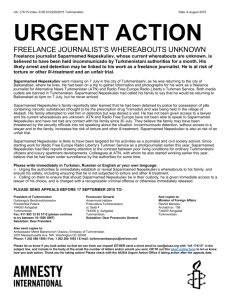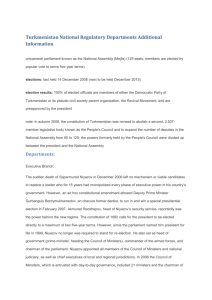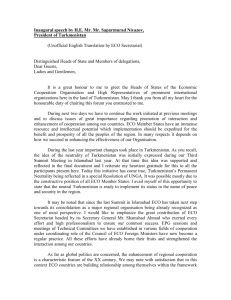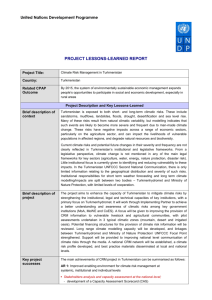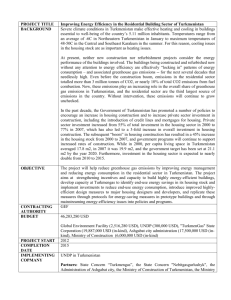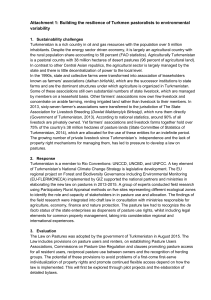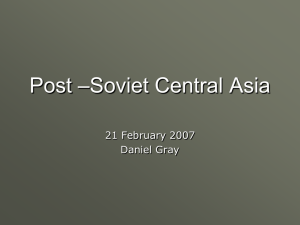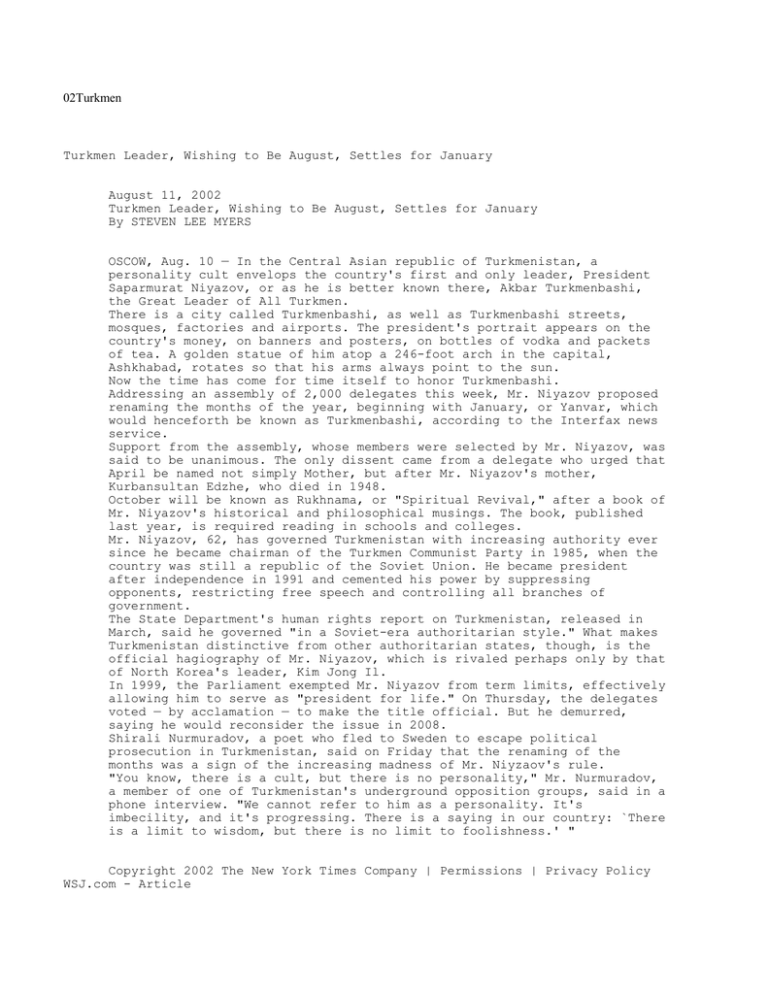
02Turkmen
Turkmen Leader, Wishing to Be August, Settles for January
August 11, 2002
Turkmen Leader, Wishing to Be August, Settles for January
By STEVEN LEE MYERS
OSCOW, Aug. 10 — In the Central Asian republic of Turkmenistan, a
personality cult envelops the country's first and only leader, President
Saparmurat Niyazov, or as he is better known there, Akbar Turkmenbashi,
the Great Leader of All Turkmen.
There is a city called Turkmenbashi, as well as Turkmenbashi streets,
mosques, factories and airports. The president's portrait appears on the
country's money, on banners and posters, on bottles of vodka and packets
of tea. A golden statue of him atop a 246-foot arch in the capital,
Ashkhabad, rotates so that his arms always point to the sun.
Now the time has come for time itself to honor Turkmenbashi.
Addressing an assembly of 2,000 delegates this week, Mr. Niyazov proposed
renaming the months of the year, beginning with January, or Yanvar, which
would henceforth be known as Turkmenbashi, according to the Interfax news
service.
Support from the assembly, whose members were selected by Mr. Niyazov, was
said to be unanimous. The only dissent came from a delegate who urged that
April be named not simply Mother, but after Mr. Niyazov's mother,
Kurbansultan Edzhe, who died in 1948.
October will be known as Rukhnama, or "Spiritual Revival," after a book of
Mr. Niyazov's historical and philosophical musings. The book, published
last year, is required reading in schools and colleges.
Mr. Niyazov, 62, has governed Turkmenistan with increasing authority ever
since he became chairman of the Turkmen Communist Party in 1985, when the
country was still a republic of the Soviet Union. He became president
after independence in 1991 and cemented his power by suppressing
opponents, restricting free speech and controlling all branches of
government.
The State Department's human rights report on Turkmenistan, released in
March, said he governed "in a Soviet-era authoritarian style." What makes
Turkmenistan distinctive from other authoritarian states, though, is the
official hagiography of Mr. Niyazov, which is rivaled perhaps only by that
of North Korea's leader, Kim Jong Il.
In 1999, the Parliament exempted Mr. Niyazov from term limits, effectively
allowing him to serve as "president for life." On Thursday, the delegates
voted — by acclamation — to make the title official. But he demurred,
saying he would reconsider the issue in 2008.
Shirali Nurmuradov, a poet who fled to Sweden to escape political
prosecution in Turkmenistan, said on Friday that the renaming of the
months was a sign of the increasing madness of Mr. Niyzaov's rule.
"You know, there is a cult, but there is no personality," Mr. Nurmuradov,
a member of one of Turkmenistan's underground opposition groups, said in a
phone interview. "We cannot refer to him as a personality. It's
imbecility, and it's progressing. There is a saying in our country: `There
is a limit to wisdom, but there is no limit to foolishness.' "
Copyright 2002 The New York Times Company | Permissions | Privacy Policy
WSJ.com - Article
September 17, 2002
Revived Trans-Asian Gas Project Lifts Hope Of Prosperity
DOW JONES NEWSWIRES
ISLAMABAD (AP)--Once, it was envisioned as a pipeline of peace in central
and south Asia. Then the idea was shattered by war in Afghanistan. Now
it's back, with dreams of boosting prosperity for some of the world's
poorest countries.
The project is a gas pipeline from the vast Dauletabad-Donmez fields of
Turkmenistan that would cross the mountains and deserts of Afghanistan to
a terminus in Pakistan.
And maybe, if traditional enmities are overcome, it could even extend to
energy-parched India.
Ministers from the three countries were meeting this week in Kabul, the
Afghan capital, to discuss a feasibility study to be financed by the Asian
Development Bank.
Planners must find the finances, evaluate potential markets and form the
consortium to build the US$2.4 billion pipeline, which will stretch 1,460
kilometers across mostly barren land and carry a projected 15 billion
cubic meters of gas a year. The Itochu conglomerate of Japan has expressed
interest in investing.
Although the U.S. is no longer involved - it was once in the thick of
pipeline negotiations - President Pervez Musharraf discussed the project
with President George W. Bush during their brief meeting in New York last
week. U.S. officials told The Associated Press the new Afghan government,
untested in the ways of multinational business, wanted a U.S. observer
involved.
Economic benefits of the pipeline are clear: it would open an outlet at
the Arabian Sea port of Karachi to Asian markets for Turkmenistan, which
according to estimates of the Asian Development Bank may have the world's
fourth largest gas reserves. Its construction would provide 12,000
much-needed jobs in Afghanistan, and then an estimated US$300 million in
transit fees annually. And it would offer a source of energy and port
revenues for Pakistan.
But there are risks, too: Afghanistan remains unsettled and its new
government has yet to firmly establish its authority outside the capital.
Pakistan is rife with sectarian terrorism and attacks on Western
interests, and Turkmenistan faces the uncertainty of an aging
authoritarian leadership.
Promoters say the pipeline will have a political dividend.
"This project will help establish peace and stability in the region,"
Turkmen Vice President Yolly Gurbanmuradov, who is in charge of the
development, said in Kabul.
A Pakistan-India pipeline has been explored several times in recent years,
and touted as a way give the rival nations a shared economic interest and
help bridge more than a half century of warfare and distrust.
Musharraf has said he doubts a deal with India is possible with the
current level of tension. But Energy Minister Usman Aminuddin was quoted
as telling the Kabul meeting that Pakistan could still include India in
"the first mega-project of the 21st century."
When the so-called CentGas project was first discussed in the mid-1990s,
it was hotly contested by energy companies - and by their governments.
Energy was then a major factor in determining U.S. policy toward
Afghanistan and in Washington's initial welcome for the Taliban regime
that seized control of the country in 1996 after a two-year march on the
capital.
2
The U.S. saw the Taliban victory as a chance to bring order to a country
that had been ruled by an uneasy alliance of warlords who were still
feuding among themselves and battling over territory where a pipeline
ultimately would have to pass.
Policy-makers were unaware or dismissive of the lethal friendship being
formed on another track by Taliban leaders with Osama bin Laden, the
Saudi-born financier of terrorism who moved to Afghanistan after he was
expelled from Sudan in 1996, or the extent of the Taliban's Islamic zeal
imposed on its own people.
Before and even after the Taliban takeover of Kabul in September 1996, a
corporate war was raging over rights to develop and transport gas over
Afghanistan, primarily between Bridas of Argentina and the American
company Unocal Corp. (UCL) of El Segundo, California.
Competition was cutthroat. Both Bridas and Unocal signed deals with
Pakistan, Turkmenistan and the Taliban, only to be undermined by the
other. Bridas once sued Unocal for US$15 billion, alleging that the
American company prevented it from developing Turkmen gas fields, but a
Texas court dismissed the case.
Ultimately, Unocal was forced to withdraw in 1998 after the U.S. fired
missiles at bin Laden's suspected hide-out in retaliation for the bombing
of the U.S. embassies in Kenya and Tanzania. It also had been under
pressure from feminist and human rights groups over its collaboration with
the repressive Taliban authorities.
Unocal's pullout, and the endless Afghan civil war, buried the CentGas
consortium.
In a statement to its stockholders in May, Unocal said the project was
meant to promote stability.
"We met many factions, including the Taliban, to educate them about the
benefits such a pipeline could bring to this desperately poor and war-torn
country," Unocal said, adding it had no interest in getting involved in
Afghanistan again.
Now the new government of Afghan President Hamid Karzai sees the revival
of the plan as a sign of confidence in the future.
"In the last few years of war, it was not practically possible to think
seriously about this project," said Afghan Mines Minister Juma M.
Mahammadi. "Luckily, that problem is over now."
URL for this article:
http://online.wsj.com/article/0,,BT_CO_20020917_008575.djm,00.html
Updated September 17, 2002 11:33 p.m. EDT
Copyright 2002 Dow Jones & Company, Inc. All Rights Reserved
Printing, distribution, and use of this material is governed by your
Subscription agreement and Copyright laws.
For information about subscribing go to http://www.wsj.com
Analysts Predict Radical Change Near For TurkmenistanTOL WIRE: News
posted on TOL Wire on 22 October 2002
Analysts Predict Radical Change Near For Turkmenistan
from Eurasianet
3
ASHGABAT, 22 October (Eurasianet)--In Turkmenistan, children memorize poetry
written by President Sapurmarat Niyazov, and deputies kiss his hand when they
greet him. Although Niyazov’s cult defines Turkmenistan today, human rights
activist Vitaly Ponomaryov portrayed the regime as practically doomed at a
conference held in New York on 21 October.
"The regime is brittle, it’s not stable," Ponomaryov told the audience at an
open forum sponsored by the Central Eurasia Project of the Open Society
Institute, "and it’s quite likely that a radical change will take place within a
year or sooner."
In addition to Ponomaryov, other key speakers on Turkmen domestic politics
included Russian journalist Arkdady Dubnov, former Turkmen Foreign Minister Avdy
Kuliev, and a dissident living in Turkmenistan who asked for anonymity.
All of the speakers agreed with Ponomaryov’s theory that radical change will
come to Turkmenistan in the next few years. Opinions differed, however, on how
peacefully change would occur in Turkmenistan.
Ponomaryov noted that Kuliev, a former foreign minister living in exile in
Moscow, had been more vocal in his opposition during the past twelve months. So
has Boris Shikhmuradov, another former foreign minister who broke with Niyazov
in late 2001. This strident opposition, combined with Turkmenistan’s neutrality
toward the antiterrorist coalition against the Taliban in neighboring
Afghanistan, has made more countries aware of Niyazov’s record.
Kuliev, while insisting that Turkmenistan can only make progress if Niyazov
steps down, stressed the importance of coordinating opposition efforts with the
United States. He put hope in House Congressional Resolution 397, a non-binding
statement from the U.S. Congress in 2000 that urged Central Asian presidents to
engage in roundtable discussions with opposition movements.
While Kuliev said he spoke for 4,000 dissidents inside Turkmenistan, Dubnov
dismissed the idea of trying to persuade Niyazov to accept the platform of his
opposition. Ponomaryov, seeing that Shikhmuradov has already called for Niyazov
to step down, wondered how any orderly succession could take place. "The regime
is so brittle that whenever [Niyazov] goes, nobody will be able to assume power
in the way he has, and the system will collapse."
In this political environment, dissidents are working within Turkmenistan trying
to draw the world’s attention. The dissident told the audience that several
unofficial civil society groups are trying to create Turkmenistan’s first
Helsinki Committee, an organization that would record and protest Niyazov’s
failure to abide by the standards of international human rights.
"We see two main tasks which involve monitoring these human rights violations
and categorizing them, and also providing assistance and advice to citizens as
far as what their rights are. The people performing this service are [incurring]
great personal risk, which indicates how much they love their country " the
anonymous activist said.
The news items posted on TOL Wire have been edited by TOL staff with only minor
changes to the original content. Larger additions are marked as follows: [TOL
Copyright © 2002 Transitions Online. All rights reserved.
Country Guide / The Times of Central AsiaDaily news from
4
Wednesday, Nov 27, 2002
State Structure:
Executive branch:
Chief of state: President and Chairman of the Cabinet of
Ministers Saparmurat NIYAZOV (since 27 October 1990,
when the first direct presidential election occurred);
note - the president is both the chief of state and head
of government.
Head of government: President and Chairman of the
Cabinet of Ministers Saparmurat NIYAZOV Cabinet: Council
of Ministers appointed by the president.
Elections: president elected by popular vote for a
five-year term; election last held 21 June 1992 (next
scheduled to be held NA); note - President NIYAZOV was
unanimously approved as president for life by the
Assembly on 28 December 1999); deputy chairmen of the
cabinet of ministers are appointed by the president.
Election results: Saparmurat Niayazov elected president
without opposition; percent of vote - Saparmurat NIYAZOV
99.5%
Chiefs of State and Cabinet Members in Turkmenistan:
PresidentNiyazov, Saparmurat
Chmn., Supreme Council (Mejlis)Halliyev,
Tagandurdy
Dep. Chmn., Cabinet of Ministers (Agriculture,
Business Development, & Light Industry)Saparov,
Rejep
Dep. Chmn., Cabinet of Ministers (Banking &
Currency Affairs)
Dep. Chmn., Cabinet of Ministers (Communications &
Transport)Rejepov, Berdimyurat
Dep. Chmn., Cabinet of Ministers
(Construction)Hudayguliyev, Muhammetnazar
Dep. Chmn., Cabinet of Ministers
(Energy)Gurbanmuradov, Yolly
Dep. Chmn., Cabinet of Ministers
(Healthcare)Berdimukhamedov, Gurbanguly
Dep. Chmn., Cabinet of Ministers (Textiles &
Foreign Trade)Geoklenova, Jemal
Min. of AgricultureSaparov, Rejep
Min. of CommunicationKhozhagurbanov, Resulberdi
Min. of CultureAydogdiyev, Orazgeldy
Min. of DefenseArazov, Rejepbay
Min. of Economics & FinanceAtayeva, Geldiyevna
Min. of EducationAshirov, Annagurban
Min. of Energy & IndustryJumaguljov, Annaguly
Min. of Environmental ProtectionRajapov, Matkarim
Min. of Foreign AffairsMeredov, Rashid
Min. of Health & Medical IndustryBerdimukhamedov,
Gurbanguly
Min. of Industry & Construction
MaterialsHudayguliyev, Mukhammetnazar
Min. of Internal AffairsKakabayev, Annaberdy
Min. of JusticeKasimov, Gurban
Min. of Oil & Gas Industry & Mineral
ResourcesNazarov, Gurban
5
Min. of Social SecurityBegmuradov, Orazmurat
Min. of Trade & Foreign Economic RelationsGayibov,
Charymammed
Min. of Water ResourcesVelmuradov, Gurbangeldi
Chmn., Central Bank
Chmn., National Committee for Security
(KNB)Berdiyev, Poran
Ambassador to the USOrazov, Mered
Permanent Representative to the UN, New
YorkAtayeva, Aksoltan
Administrative divisions: 5 welayatlar (singular welayat): Ahal Welayaty (Ashgabat), Balkan Welayaty
(Nebitdag), Dashhowuz Welayaty (formerly Tashauz), Lebap
Welayaty (Charjew), Mary Welayaty.
Legislative branch:under the 1992 constitution, there
are two parliamentary bodies, a unicameral People's
Council or Halk Maslahaty (more than 100 seats, some of
which are elected by popular vote and some of which are
appointed; meets infrequently) and a unicameral Assembly
or Majlis (50 seats; members are elected by popular vote
to serve five-year terms)
elections:president elected by popular vote for a
five-year term; election last held 21 June 1992 (next
scheduled to be held NA); note - President NIYAZOV was
unanimously approved as president for life by the
Assembly on 28 December 1999); deputy chairmen of the
cabinet of ministers are appointed by the president
Economic Overview:
Turkmenistan is largely desert country with intensive
agriculture in irrigated oases and huge gas (fifth
largest reserves in the world) and oil resources.
One-half of its irrigated land is planted in cotton,
making it the world's tenth largest producer. Until the
end of 1993, Turkmenistan had experienced less economic
disruption than other former Soviet states because its
economy received a boost from higher prices for oil and
gas and a sharp increase in hard currency earnings. In
1994, Russia's refusal to export Turkmen gas to hard
currency markets and mounting debts of its major
customers in the former USSR for gas deliveries
contributed to a sharp fall in industrial production and
caused the budget to shift from a surplus to a slight
deficit.
With an authoritarian ex-communist regime in power and a
tribally based social structure, Turkmenistan has taken
a cautious approach to economic reform, hoping to use
gas and cotton sales to sustain its inefficient economy.
Privatization goals remain limited. In 1998-2000,
Turkmenistan suffered from the continued lack of
adequate export routes for natural gas and from
obligations on extensive short-term external debt. At
the same time, however, total exports rose sharply
because of higher international oil and gas prices.
Prospects in the near future are discouraging because of
widespread internal poverty and the burden of foreign
debt. IMF assistance would seem to be necessary, yet the
government is not as yet ready to accept IMF
requirements.
6
Turkmenistan's 1999 deal to ship 20 billion cubic meters
(bcm) of natural gas through Russia's Gazprom pipeline
helped alleviate the 2000 fiscal shortfall. Inadequate
fiscal restraint and the tenuous nature of
Turkmenistan's 2001 gas deals, combined with a lack of
economic reform, will limit progress in the near term.
Industries: natural gas, oil, petroleum products,
textiles, food processing.
Agriculture - products: cotton, grain; livestock
Exports - commodities: gas 33%, oil 30%, cotton fiber
18%, textiles 8% (1999).
Imports - commodities: machinery and equipment 60%,
foodstuffs 15% (1999).
Investors: Ukraine, Turkey, Russia, Germany, US,
Kazakhstan, Uzbekistan.
GENERAL INFORMATION:
Facts at a Glance, Flag Description, State Symbol,
Country Map, Arch Of Neutrality, Survival Info,
Embassies, Passport and Visa, Money and Costs, Public
Holidays, Voltage, Weight, Metric System, Useful links,
Add Your Link
COUNTRY PROFILE:
Geography, Environment, Provinces, Main Cities, Climate,
History, State Structure, Economic Overview, Export,
Import, Investors, Special Topic
TO AND IN:
How to get there, Air, Road, Culture & Arts, Museums,
Theaters, Cinemas, National music samples, What to do,
Turkmen Cuisine, Hotels, Recreation possibilities, ABC
Copyright © 1999-2002
The Times of Central Asia
News / The Times of Central AsiaDaily news from Central Asia!
afghan.times.kg
photo.times.kg
Wednesday, Nov 27, 2002
<<
News Archive:
< Nov, 2002
>
>>
Date (dd mm yyyy)
7
Turkmenistan's Cotton Plan Not Fulfilled
Turkmenistan, November 21, 2002 [ 21:57 ]
By Gulshen Ashirova, TCA contributor, TCA
ASHGABAT (TCA). This year's cotton harvest is a failure
even according to official statistics: Turkmen cotton
growers have gathered less than 25% of the state's
estimate for 2002, about 500,000 tons of cotton. Of 43
districts of Turkmenistan only two, Sakar and
Serdarabad, have gathered a half of the estimate,
whereas the northern regions have barely reached 10% of
the plan. President Saparmurad Niyazov set up an ad hoc
commission including prosecution officials to reveal the
reasons for the plan's failure.
True reason for the low harvest
Early last week, Saparmurad Niyazov discussed the
reasons for the cotton harvest plan failure with
agricultural scholars. The governors of the country's
provinces did not attend the meeting. The scholars think
the reasons for the low cotton harvest are
agro-technical mistakes, bad selection, and low-quality
cotton seeds. They offered recommendations for better
organizing the crop next year. The head of state
instructed the scholars to analyze the entire course of
cotton growing and, by the end of November, present to
cotton farmers a map of cotton zoned according to the
type of seed and to recommendations on how best to
produce an efficient crop.
The agrarian scholars have taken the blame for the
plan's failure upon themselves, not referring to
unfavorable weather conditions and inefficient
administration. They said the plan's failure owes to
mistakes in the zoning of cotton sorts. However, none of
them dared to tell about the true reason for the low
harvest, a distorted reading of the actual area under
cotton. This year, 120,000 hectares of cotton were sown
on paper only. Other reasons are poor soil quality, a
lack of fertilizers and chemical weed/pest killers, the
absence of quality seeds caused by bad selection work, a
lack of agricultural machinery, and low motivation
amongst cotton pickers because of late payment for their
hard work. So the harvest failure was programmed from
the very beginning.
In Soviet times, Turkmenistan was one of the major
cotton producers in the Soviet Union. The centralized
Soviet budget allocated up to 5 billion rubles a year in
subsidies for Turkmenistan's cotton production. More
than 70% of this amount was used for irrigation, soil
desalination, and the maintenance of the Karakum Canal.
Today the water of this canal is not enough for normal
irrigation of cotton fields, and the highly efficient
8
drip irrigation system is only being introduced at some
cotton farms in the country. Some foreign experts
believe the steady low cotton harvests over the recent
years have been caused by the irrational and inefficient
use of water resources in different regions of
Turkmenistan. The outdated infrastructure of the Karakum
Canal leads to the loss of up to 40% of the water.
Agrarian scholars show low competence
The President's program aims to increase cotton
production. In 2002, the state plan of cotton production
was 2 million tons, whereas, according to some
estimations, Turkmenistan, a country of 5 million
people, needs no more than 100,000 tons of cotton for
domestic needs. Before the construction of the Karakum
Canal, Turkmenistan produced 400,000 tons of cotton a
year. The canal led to an increase in cotton production
to 1.3 million tons in the 1980s. Given the present bad
condition of the country's irrigation system, the
extensive cotton growing policy results in chronic
non-fulfillment of the plan. At their meeting with the
President, the Turkmen agrarian scholars showed their
low competence. They promised the Great Turkmenbashi
they would improve cotton selection.
Not long ago Turkmenistan could boast of having
excellent cotton selection specialists. Some of them
have left their trade or the homeland. One such
outstanding scholar was Prof. Victor Fursov. Together
with his sons, Vasily and Nikolai, he developed highly
productive cotton growing in Turkmenistan, gathering
3,500 kilograms of cotton in 7,500 hectares of cotton
fields belonging to seven collective farms. The Fursovs
developed a unique sort of cotton - color cotton with
self-dropping leaves. There was no need to dye cotton
fabrics, just grow cotton of the necessary color! In the
early 1990s, the Fursovs family left Turkmenistan for
Russia and took their knowledge and experience with
them, leaving no followers in Turkmenistan.
Government Jobs Lost
The end of last week saw many high-ranking officials
losing their positions. Although the result of this
year's cotton harvesting was quite predictable, nobody
expected that a catastrophe in the cotton sector would
be so great. So dismissals in the government were not
surprising. The dismissal of Deputy Prime Minister,
Redzhep Saparov, a close favorite of President Niyazov,
proved a sensation. Saparov, who supervised
Turkmenistan's agriculture, assumed the responsibility
for the collapse of the agrarian reform.
The General Prosecutor and the Interior Minister
reported to the President on the large-scale distortion
of the actual area under cotton this season. The
President dismissed four of five governors of
Turkmenistan's provinces. One of the dismissed
governors, Poran Berdiyev, said pathetic words of
9
repentance. Previously, Berdiyev was Interior Minister
and later National Security chief (he got the latter
position after outspoken accusatory speeches against his
predecessor, Muhammed Nazarov, who was then jailed for
18 years). Berdiyev, the former governor with a military
rank of general, who was appointed the chief of the
Balkan province two months ago, vowed to do his best to
redeem his agricultural faults.
Two deputy prime ministers, Enebai Atayeva and Annaguly
Jumagylydzhov, have lost their chairs and have been sent
to govern the Akhal and Mary provinces, respectively.
Kakageldy Kurbyshov, chairman of the state company
Turkmendokunkhimiya, has been appointed Governor of the
Balkan province and Deputy Agriculture Minister
Ishankuli Gulmuradov has been sent to govern the
Dashoguz province. All of the newly appointed governors
have been given a 6-month probation period. If they fail
to fulfil their duties properly during this period, they
will be fired without being offered any new positions.
To ordinary farmers, however, the punishment of
high-ranking officials is not the main thing. They hope
that this year's cotton plan failure will make the
government take new qualitative measures to reform
Turkmen agriculture.
Copyright © 1999-2002
The Times of Central Asia
News / The Times of Central AsiaDaily news from Central Asia!
Thursday, Dec 12, 2002
DEMOCRACY - "Fourth Power" in Turkmenistan
Turkmenistan, November 28, 2002 [ 18:00 ]
ASHGABAT (TCA). Turkmenistan is the only CIS country
declaring "the evolutionary democratization of society."
It is the only CIS country that is not participating in
information exchange and the protection of information
security in the Commonwealth.
Turkmenistan did not sign the agreement on the formation
of a single approach to information exchange in the CIS.
Turkmen President Saparmurad Niyazov believes that
Turkmen society, being in transition, is not yet ready
to adopt many democratic principles. This Central Asian
country has rejected the "alien democracy model" and
chosen its own way forward. In Niyazov's opinion, many
western traditions, like opera and ballet, are alien to
Turkmens. Today, thinks President Niyazov, Turkmen
citizens do not need either a multi-party system or
pluralism, even though the ruling elite has no
objections to either, in his words.
10
"Our society must grow and mature. We will not create
anything artificially", said President Niyazov who is
officially called "Turkmenbashi" (The Leader of the
Turkmens). He thinks Turkmenistan has maintained peace
and stability during the past 11 years since
independence mainly because the country has not allowed
any "shock therapy" in the economy nor has it permitted
the "unruliness" of the press that might have led to
inter-ethnic conflicts.
Today Turkmenistan has an absolute state monopoly on the
mass media. Non-state publishing activity is prohibited
and all state-owned printing companies are under strict
government control. Saparmurad Turkmenbashi is the
founder and publisher of all printed media in
Turkmenistan. So the country has no freedom of
information. The local media are not objective in
covering any processes in the political, economic, and
social spheres in Turkmenistan.
Printed media
Today Turkmenistan has about 20 state-owned printed
media sources with an overall circulation of nearly
112,000 copies, 22 copies per every one thousand
citizens (a low number for a developed country). The
largest newspaper is Neitralny Turkmenistan - the only
Russian-language newspaper in the country, with a
circulation of 28,138 copies.
All these periodicals have little newsworthy information
and are notable for the low professionalism of their
local journalists (a fact admitted by President Niyazov
who criticized and dismissed several editors). The
newspapers and magazines publish mostly official
information, passages from Rukhnama (the President's
book used as the moral code of the nation), and
patriotic material.
All these papers reprint official reports from the state
information agency, Turkmen Khabarlary (Turkmen Press).
This agency is the only information source in the
country. The secrecy regime makes it impossible to get
reliable information. The ministries and government
agencies do not have any press services to publish
reliable information and thus prevent any rumors.
Restricted access to information
The correspondents of the Turkmen newspapers and Turkmen
Press get information about the activities of the state
agencies and organizations only from the President's
Press Service or other authorized government bodies. As
a rule, only journalists of the official press have
access to meetings of the Parliament, Cabinet of
Ministers, and the People's Council. Foreign journalists
accredited in Turkmenistan are not allowed to attend
such meetings.
Turkmen journalists who made slight attempts to change
this situation in the early 1990s were forced to leave
11
Turkmenistan and the remaining are working under strict
censorship. Since gaining independence, freedom of
information in Turkmenistan has worsened. During Soviet
time, the media were allowed to do some negative
reporting along with praising official policy. Today,
all the media in Turkmenistan serve the ideology of the
state, an ideology that bolsters a totalitarian regime.
The country has only one critic - Turkmenbashi.
Of course, no civilized country in the world has ever
had and will ever have unlimited freedom of information.
Each country has limits regulated by law, common sense
and necessity. Turkmenistan, however, has a media law
that allows for some aspects of information freedom and
the rights of Turkmen journalists. But the law does not
regulate issues that relate to sourcing and obtaining
information.
The Constitution of Turkmenistan has an article
guaranteeing the right of freedom of expression and the
right to information if that information is not a state
or commercial secret. But the Constitution says nothing
about the possibility of creating, distributing, and
searching for information. The law on the media provides
no mechanism for getting information. The media have the
right to obtain information about the activities of
state bodies and government officials from these very
state bodies, but the law does not regulate the reasons
for a possible refusal in giving information; the law is
therefore useless.
Such restrictions have negative affects on the quality
of information. Unfounded information published in the
press undermines confidence in the media. At the same
time, censorship and concealing facts from the public
and the media feed rumors and promote libel.
Electronic media
Turkmenistan has three television channels: Altyn Asyr
(Golden Age), Miras (Heritage), and Yashlyk (Young Age).
These channels effectively duplicate each others
programming.
Along with the electronic media and the press, the state
also controls the Internet through the only provider
since 2000 - the state company Turkmen Telecom. In 2000,
the Communication Ministry recalled the licenses of all
private Internet providers in the country, including the
largest provider, Ariana, that served foreign missions
and oil companies in Turkmenistan.
After that, Turkmen Telecom's tariffs for Internet
access has risen fivefold and the dial-up tariff is also
very high. Late last year all Internet cafes were
closed. Many sites "not favored" by the government are
censored or prohibited. Turkmenistan still does not have
any legislative act regulating Internet use.
Russian media
12
In July 1997 the President of Turkmenistan issued a
decree prohibiting the import of foreign printed and
electronic information sources that "can cause political
damage to Turkmenistan". Turkmen customs take any
Russian media from people entering the country. Russian
printed material that reports on politics has not been
sold in Turkmenistan for the past 2-3 years. This year
there was no subscription to the Russian press. You can
only buy here entertaining Russian newspapers and
magazines, such as Speed Info, Intim, fashion and
children's magazines.
In Turkmenistan, with about 7% of its citizens
Russian-speaking, the overall circulation of
Russian-language press is only 2% of the entire press
circulation.
Turkmen television broadcasts only a 10-minute news
program a day. Radio broadcasts in Russian have been
stopped since March 1998.
Turkmenistan did not sign an agreement with Russia on
the broadcast of Russian television and radio channels
in Turkmenistan. The Turkmen government still allows
national television to broadcast one Russian television
channel, ORT, shortening its programs and restricting
the broadcast to five to six hours a day. Recently, the
government has closed the cable television network that
showed Russian television channels. The country is still
broadcasting Russia's Mayak radio on the middle and
ultra-short bandwidths.
Turkish media
Broadcasting to all the Turkic-speaking CIS countries,
Turkey's Eurasia television shows its programs four
hours a day on the third Turkmen television channel. The
Turkmen government considers Eurasia an educational
channel because its programs tell much about history and
culture.
Turkey's Zaman newspaper is printed here in both the
Turkish and Turkmen languages. The circulation is 50,000
copies. Zaman has offices in 15 countries. The office of
TRT (Turkish Radio & Television) opened in Ashgabat in
2000 and is the regional office for Central Asia. Four
TRT correspondents are accredited by the Turkmen Foreign
Ministry.
Today the basic guidelines for the Turkmen nation is the
President's "holy" book, Rukhnama, aimed to become the
moral code for the Turkmen people. Rukhnama gives
instructions on everything: from the history of the
Turkmen people to rules of behavior for citizens and
public servants. Rukhnama and the President's word have
become a substitution for the law, regulating all levels
of the Turkmen government. So "freedom of information"
in Turkmenistan, based on the President's words alone,
is wrong by definition.
Copyright © 1999-2002
The Times of Central Asia
13
FT.com / World / Asia-Pacific
Turkmenistan expels Uzbekistan's ambassador
By David Stern in Moscow
Published: December 22 2002 22:12 | Last Updated: December 22 2002
22:12
Turkmenistan expelled the ambassador of neighbouring Uzbekistan at
the weekend, accusing him of assisting in a recent alleged
assassination attempt on Saparmurat Niyazov, the Turkmen president.
The move significantly raises tensions between the two former Soviet
Central Asian states and threatens the fragile stability of the
region.
Abdurashid Kadyrov, Uzbekistan's ambassador in Ashgabat, the Turkmen
capital, was accused by Turkmen officials last week of aiding Boris
Shikhmuradov, Turkmenistan's former foreign minister, in an
assassination attempt on the president. Mr Kadyrov was said to have
harboured Mr Shikhmuradov in his residence and then helped him
escape the country.
Mr Shikhmuradov is accused of masterminding an attack on President
Niyazov's motorcade in November which was supposed to have led to a
coup d'etat.
Turkmen authorities searched the Uzbek embassy last week.
Uzbek officials in Tashkent called the act a "gross violation" of
international norms and said that the accusations that they has
assisted the Turkmen opposition leader were "absolutely unfounded".
Turkmenistan's foreign ministry however declared on Saturday that
Ambassador Kadyrov was involved in "activities incompatible with the
high status of a diplomat" and gave him 24 hours to leave the
country.
The Ashgabat officials' accusations threaten to further spoil
relations with Turkmenistan's neighbours and increase its
self-imposed isolation within the Central Asian region.
Turkmenistan - a gas-rich, mostly desert, nation of 5m on the
eastern shore of the Caspian Sea - is shunned by the surrounding
states, thanks in large part to the eccentric actions of its
62-year-old autocratic ruler, Mr Niyazov.
Critics say that Mr Niyazov, who calls himself "Turkmenbashi", or
"Father of the Turkmens", has built neo-Stalinist culture, complete
with a bizarre personality cult devoted to his glorification.
The Turkmen leader's likeness graces government buildings, public
parks and the country's banknotes.
At the same time, Mr Niyazov has cut the country off from the
outside world and strictly controls the number of foreign citizens
crossing its borders.
Now in the aftermath of the alleged assassination bid, Turkmen
officials claim outside forces conspired to topple the country's
government.
Of 46 individuals so far arrested, 17 were foreigners, officials
say. Russia, Azerbaijan and Turkey are also said to have assisted
the coup plotters.
14
A US citizen, Leonid Komarovsky, was also arrested and read an
emotional confession on Turkmen television last week, asking for the
Turkmen leader's forgiveness for having provided mobile phones to
the would-be assassins.
On Thursday, Douglas Davidson, the US representative to the
Organisation for Security and Co-operation in Europe, said reports
indicated that confessions in Turkmenistan had been "extracted by
torture".
WSJ.com - Turkmenistan's Allegations Could Disrupt Central Asia
December 26, 2002
Turkmenistan's Allegations
Could Disrupt Central Asia
By STEVE LEVINE
Staff Reporter of THE WALL STREET JOURNAL
ALMATY, Kazakhstan -- A month ago, the isolationist leader of Turkmenistan
reported an assassination attempt against himself. Since then, diplomats
and independent analysts say, President Saparmurat Niyazov has risked
roiling strategic Central Asia by alleging an international terrorist
plot.
President Niyazov, whose official last name is the Great Leader of the
Turkmen, now alleges a conspiracy involving a U.S. businessman, almost all
his exiled opposition and four dozen other plotters. He has accused Russia
and Azerbaijan of collaboration in the alleged plot and expelled the Uzbek
ambassador. As part of a wide-ranging investigation, his security forces
have also searched U.S. Embassy vehicles.
The U.S. and the European Union have urged an international investigation
of alleged torture in the probe, and the U.S. plans Thursday to issue a
diplomatic protest about the jailing of Leonid Karmarovsky, a Newton,
Mass., businessman, in the alleged plot.
Turkmenistan, a republic of four million people with the world's
fourth-largest reserves of natural gas, has attracted much attention from
foreign energy companies over the past decade. But unlike its Caspian
neighbors, it has garnered no major international contracts, because of
what some foreign company officials say is Mr. Niyazov's unpredictable
government.
Some analysts say President Niyazov's actions, particularly the
accusations against his neighbors, could raise tensions in the fragile
Caspian Sea region, which neighbors Afghanistan and is the site of U.S.
military bases for its fight against terrorism. Others say President
Niyazov may inadvertently generate just the personal peril he fears if
some of Turkmenistan's remaining elite worry about who will be the
president's next target. "This makes Turkmenistan less, not more, stable,"
said a diplomat in the republic.
The alleged assassination is a serious turn of events for a republic that
is more often the butt of regional jokes. The 62-year-old Mr. Niyazov
declared himself president for life not long after independence in 1991
and has named scores of memorials, squares, cities, streets and parks
after himself. Many local and foreign analysts doubt the government's
version of events; some are unconvinced that an assassination attempt even
took place. One question frequently raised by critics is why an ostensibly
professional hit squad employed automatic weapons incapable of penetrating
the presidential car, well-known to be armored.
"Even if you watch movies, you know this wouldn't work. You need a grenade
15
launcher. This is theater," said Oraz Iklimov, a Moscow-based
correspondent for Radio Liberty/Radio Free Europe, who says that 24 of his
relatives are in police custody for involvement in the alleged plot.
Write to Steve LeVine at steve.levine@wsj.com1
URL for this article:
http://online.wsj.com/article/0,,SB1040863003406269313,00.html
Hyperlinks in this Article:
(1) mailto:steve.levine@wsj.com
Updated December 26, 2002
Copyright 2002 Dow Jones & Company, Inc. All Rights Reserved
Printing, distribution, and use of this material is governed by your
Subscription agreement and Copyright laws.
For information about subscribing go to http://www.wsj.com
16

